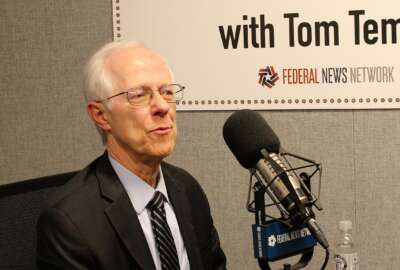New HHS request for proposals has industry up in arms
The Centers for Medicare and Medicaid Services (CMS) has released a request for proposals that industry finds puzzling.
The Centers for Medicare and Medicaid Services (CMS) has released a request for proposals that industry finds puzzling. CMS terminated an existing call center contractor after two years. That award had taken three years to establish. CMS is requiring re-compete contractors to have labor harmony agreements. The Federal Drive with Tom Temin looks into this puzzle with the President and CEO of the Professional Services Council, David Berteau.
Interview Transcript:
Tom Temin And David, have you ever seen anything like this before?
David Berteau Tom, I’ve been around this business for almost half a century now, and I’ve never seen this kind of action with this kind of intent. First of all, it’s a one-year contract with nine one-year options, and it was awarded in September of 2022. So, it’s not even two years ago, right? They’re not actually terminating the contract. What’s really interesting here is assuming the RFP is successful and they’re ready to negotiate a new contract, they just will fail to exercise the next option. And this has two problems. Number one is there’s no termination clause exercised. So, there’s no termination for good reason. There’s no recovery of costs that you might have already sunk in for the next year’s performance, etc.. So, you know, it reduces the contractor’s ability to recover any costs that they may have already incurred. But more importantly, it’s done without cause. There’s no reason for it other than to insert a labor harmony agreement into the existing work.
Tom Temin And a labor harmony agreement is not to be confused with a labor payment agreement where you’re using prevailing wages or something, but it implies that there has to be a union in place.
David Berteau It does actually. And you’ve touched on something that’s really key here. You know, this is the type of contract that’s under the service contract agreement. So, wages are capped under the SCA. PSC for a long time has been arguing it’s time to update those wages. You know we’ve got an administration that wants to pay people higher wages. But in order to do that, you actually have to reimburse the contractor for those higher costs. And that means that the government has to actually spend more money on the contract. Well, the service contract act as it’s currently structured, doesn’t let you do that. One way around that is with a collective bargaining agreement. So, a union is a way to do that. But that’s a lousy way to fix what’s a universal problem across all government contracting.
Tom Temin Yeah. So having a labor harmony agreement means there has to be a labor agreement in the first place with a no strike clause.
David Berteau Well, the RFP is both inconsistent and incompatible with itself in this regard. In one place, the RFP makes it clear that the solicitor, the bidder, should have a labor harmony agreement in place before the contract starts. In another place, the RFP requires that the winning bidder would entertain negotiations with an interested union if they raised it after the contract is in place. Well, you can’t have it both ways, Tom. And this kind of ambiguity, I think, shows a level of sloppiness and hurriedness in this submission that does not bode well either for contract in general or for this particular contract. And it’s not like open season for Medicare is a trivial matter. You know, there’s probably 50, 60 million Americans who are going to be interested in having a good call center and the current ones working really well. In fact, we’ve seen the letter from CMS to the Congress, which indicates that current performance is 95% excellent rating. I don’t know about you, Tom, but I don’t have any call center that I deal with, and I would give them a 95% excellent rating.
Tom Temin Right. This is a customer experience type of situation that CMS is finding itself in.
David Berteau Exactly. And you want this to be as satisfactory a performance as you can. People all across America depend upon knowledgeable, capable person at the other end of the line when they call, but they expect good service and by and large, they’ve been getting it.
Tom Temin We’re speaking with David Berto, president, and CEO of the Professional Services Council. Is this the type of situation if another company were to come in and win that re compete, that it’s likely the same people actually manning the call centers. They would just have a new employer.
David Berteau That happens to leave. That’s a very important question, Tom. And as you know, this administration has put out a rule that was issued back a couple administrations ago and then reversed in the intervening and administration now back again, which gives the new contractor the first right of refusal to hire the employees of the losing contractor. Well, this is a flawed approach in two ways. Number one is it assumes that the employees actually are sort of the government employees, and we’re just paying them through the contractor. But guess who hired them? Guess you trained them. Guess who promoted them? Yes. You gave them a career path. Guess who invested in them? It’s the company. It’s not the government. And in many cases, those are not reimbursable costs. You know, those are costs that are borne by the company themselves. So, you would have a situation where the winning bidder might not have the people in place want to hire the incumbent people, and the incumbent may actually have other work to do for those employees. And much rather take those employees and use them elsewhere. And that’s a very serious problem. That’s not just in this particular contract, but across the federal government today.
Tom Temin And there’s also the issue of this contract, right. Compete seeming to force unionization on companies, almost like you have to go out and find the union and create a contract with it, which seems to be contrary to the National Labor Relations Act, which means the government is a referee in union negotiations, but they don’t force unions on companies.
David Berteau And that’s exactly the case, Tom. In fact, the Federal Acquisition Regulation itself, part 22 of the FAR, declares very clearly that the government will remain neutral in any labor union negotiations or any labor dispute between the company and its employees, as long as in fact, the contract performance is not affected by that. This appears to be in violation of the FAR as well as in. Many have raised questions about whether or not it’s consistent with the National Labor Relations Act. This has a long way to go, but not much time to do it in, because the RFP expects solicitations to be submitted by June 28th. And Tom, that’s just a month away.
Tom Temin Right. And you also note in what you are communicating to company members of the council that the HHS or CMS actually came from. The secretaries of HHS office said that they would be re competing this asking for comments on the idea of inserting the labor harmony agreement some months ago, but we don’t know what the reaction was to that solicitation for comments.
David Berteau Right? The government frequently issues a request for information, right. An RFI and interested parties can solicit information to the government, which the government then is unlike, you know, something under the Administrative Procedure Act in a rulemaking process where the government has to post a comment and then determine what they did with that adjudication process. That’s not true for a response to an RFI. There have been two requests in this situation one, last summer in 2023, CMS put out a request for information for companies that might be interested, basically, and asked if we had a labor harmony requirement, would you be in? Now we don’t know what anybody responded. We don’t know how many responses were submitted. So that’s not a matter of public record. But we can assume that some companies probably said no, we wouldn’t. And others probably said, yeah, we would certainly consider bidding. Then, as you note, the Secretary of HHS put out a press release back right before Christmas. That said, we do intend to recompete this. And then in March of this year, there was another document issued by CMS. And this was a source’s sought notice, right, where you would respond if you might be interested in bidding. And of course, this also highlighted the labor Harmony agreement as a potential requirement. Again, we don’t know who responded. We don’t know how many responses. We don’t know what those responses said. But barely a month later comes the RFP itself.
Tom Temin Well, is it also possible that the current incumbent that’s getting high ratings for its work, Maximus was offered the chance to suddenly build in a contract with labor and put in the, you know, strike agreement. And they said, well, you know, why should we? Everything is going along just fine.
David Berteau I’m not privy to those kinds of discussions. I don’t know what kind of discussions CMS may have had with their existing contractor. That’s not a matter of public record. But, you know, the government certainly could have that as an option. But I would note that given how long it takes to solicit, evaluate, and award contracts of this magnitude and complexity, it’s not in the government’s interest to create uncertainty in that regard, and particularly to create uncertainty when there’s no visible problem that you’re trying to solve in that regard. And that’s what makes this kind of an unprecedented move, because we haven’t seen this is not really about call centers. It’s not really about Medicare. This is really about government contracting across the board. You know, if you don’t have the stability of being able to bid and win and perform a contract as it’s solicited and with the government, if they want to make changes to go through the normal change order process, and if it’s a unilateral change by the government, then there would be consideration that the contractor would get in exchange for doing that. Government desired unilateral change. This is way outside the norm of that kind of behavior, and that’s the fundamental premise on which government contracting rests. It’s the fundamental premise on which companies bid and invest their money to be prepared to do work. If you start throwing that upside down, you’re going to eliminate a lot of potential problem. You’re probably going to reduce even competition, because one of the things this RFP does is requires that a company has past experience with a labor harmony agreement. Well, we haven’t been requiring labor harmony agreements. This is going to dramatically limit the competition. And it also requires that it flows down to all subcontractors, none of whom have any experience with this sort of thing. What a mess.
Copyright © 2025 Federal News Network. All rights reserved. This website is not intended for users located within the European Economic Area.
Tom Temin is host of the Federal Drive and has been providing insight on federal technology and management issues for more than 30 years.
Follow @tteminWFED





